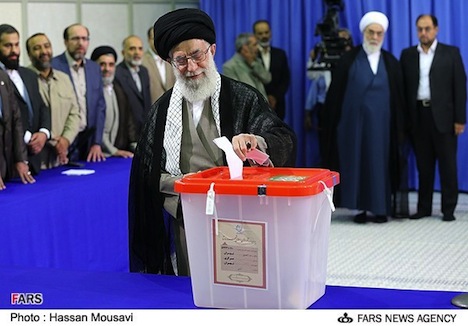It’s only 10 a.m. on the U.S. east coast, but that means we’re approaching nighttime in Tehran — it’s now 6:30 p.m. and voters are finishing a day of voting to select a new president.![]()
All of the candidates, plus Iran’s Supreme Leader Ali Khamenei (pictured above), have cast their ballots in what is expected to be just the first round of the election. With eight candidates originally approved to run by Iran’s Guardian Council and with six candidates remaining in the race today, it seems unlikely that any single candidate will win the 50%-plus support required to avoid a runoff of the top two vote-winners next Friday, June 21.
Polls showed that the most likely runoff would be between moderate cleric Hassan Rowhani, Iran’s former nuclear energy negotiator, and conservative ‘principlist’ Tehran mayor Mohammad Baqer Qalibaf, though I have argued that the race is so fluid that any of the top five candidates could wind up in the runoff, including current nuclear negotiator Saeed Jalili, former foreign minister Ali Akbar Velayati and the former head of the Revolutionary Guards Mohsen Rezai.
The winner will replace outgoing president Mahmoud Ahmadinejad, himself the former mayor of Tehran, whose populist focus on economic issues swept him to power in 2005 and to reelection in 2009, though his relationship with the Supreme Leader has frayed in recent years and many of the current candidates have blamed him for Iran’s economic woes and the international sanctions and diplomatic isolation that Iran suffers today.
Despite initial disappointment at the Guardian Council’s refusal to permit former president Hashemi Rafsanjani to run, the race has turned out to be incredibly competitive, and the six candidates represent a relatively wide diversity, as far as Iranian elections go. Candidates come from both the ‘founding’ generation of the 1979 revolution that led to the establishment of the Islamic Republic and the younger generation that came of age during the brutal war with Iraq in the 1980s. Candidates also come from both the principlist camps and the moderate/reformist camps.
Far from boycotting the race, Rafsanjani and former president Mohammed Khatami have urged voters to back Rowhani, and Khatami’s vice president, Mohammad Reza Aref, dropped out the race earlier this week in favor of Rowhani, and former supporters of the 2009 presidential candidate Mir-Hossein Mousavi and the ‘Green movement’ are likely to back Rowhani as well.
I’ll have additional thoughts when the winner(s) of the race become clear. In the meanwhile, you can follow all of my coverage of the Iranian election here.
